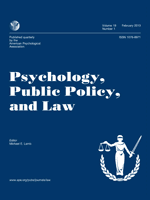
PSYCHOLOGY PUBLIC POLICY AND LAW
Scope & Guideline
Navigating the Psychological Dimensions of Legal Policy.
Introduction
Aims and Scopes
- Empirical Research in Legal Contexts:
The journal publishes studies that apply psychological theories and methodologies to understand various aspects of the legal system, including competency evaluations, eyewitness testimony, and jury decision-making. - Interdisciplinary Approaches:
Research often incorporates perspectives from psychology, law, sociology, and public policy, aiming to create a comprehensive understanding of complex legal issues. - Policy Implications:
Many articles focus on the implications of psychological research for public policy, providing actionable recommendations that can influence legislative changes and improve legal practices. - Cultural and Contextual Sensitivity:
The journal emphasizes the importance of considering cultural and contextual factors in psychological assessments and legal processes, promoting research that is relevant to diverse populations. - Innovative Methodologies:
The use of mixed-methods approaches, including qualitative and quantitative research, is encouraged to capture the multifaceted nature of legal and psychological phenomena.
Trending and Emerging
- Impact of COVID-19 on the Justice System:
Research examining the effects of the COVID-19 pandemic on court practices, correctional policies, and mental health services has surged, highlighting the need for adaptive strategies in legal contexts. - Cultural Competence in Legal Settings:
An increasing emphasis on culturally adapted interventions and assessments is evident, particularly in relation to marginalized communities, indicating a growing recognition of the importance of cultural context in psychological evaluations. - Technological Integration in Forensic Practices:
The adaptation of technology in forensic psychology, including remote evaluations and the use of videoconferencing, is a prominent trend, reflecting changes in how legal assessments are conducted in response to modern challenges. - Youth and Juvenile Justice Innovations:
There is a notable increase in research focused on juvenile justice reform, particularly interventions aimed at reducing recidivism and improving outcomes for youth involved in the legal system. - Mental Health and Legal Outcomes:
A growing body of work explores the interplay between mental health issues and legal outcomes, particularly in the context of competency evaluations and the treatment of individuals within the justice system.
Declining or Waning
- Traditional Competency Evaluations:
Although competency to stand trial remains a relevant topic, there has been a noticeable shift towards more innovative and interdisciplinary approaches, leading to a decline in traditional studies focusing solely on competency evaluations without broader contextual considerations. - General Crime Trends Analysis:
Research focused on general trends in crime statistics and broad analyses of crime rates has decreased, with a pivot towards more specific, nuanced discussions of individual cases or specific populations. - Static Risk Assessments:
The focus on static risk assessment tools has waned as newer, dynamic models that consider ongoing behavior and contextual factors gain traction, reflecting a shift towards more holistic approaches. - Broad Public Perception Studies:
While public perception remains important, studies that do not connect perceptions to specific policies or legal outcomes are less common, indicating a trend towards more targeted research that directly informs policy.
Similar Journals
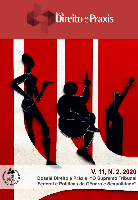
Direito e Praxis
Advancing interdisciplinary insights in legal studies.Direito e Praxis is a pioneering open-access journal dedicated to the interdisciplinary study of law, published by the esteemed Universidade do Estado do Rio de Janeiro, Faculdade de Direito. Since its inception in 2010, the journal has fostered scholarly communication in legal studies, providing a platform for researchers, practitioners, and students to engage with contemporary legal theories and practices. With a distinctive focus on the interplay between law and social dynamics, Direito e Praxis invites submissions that illuminate critical legal issues through diverse methodological approaches. In an era of increasing globalization and complexity in legal matters, this journal plays a vital role in disseminating knowledge and promoting dialogue among academics and legal professionals, particularly in the Latin American context. Researchers and students are encouraged to explore the wealth of articles that highlight innovative perspectives and contribute to the ongoing development of legal scholarship.

Revista Clinica Contemporanea
Fostering Knowledge Exchange in Clinical PsychologyRevista Clinica Contemporanea, with ISSN 1989-9912, is a distinguished open-access journal published by the Colegio Oficial Psicólogos Madrid that has been at the forefront of advancing psychological research and practice since 2010. Located in Madrid, Spain, this journal provides a vibrant platform for the dissemination of contemporary clinical psychology studies, focusing on innovative therapeutic approaches, evidence-based practices, and the integration of psychological science in a rapidly evolving societal context. With its commitment to accessibility and rigorous scholarly standards, Revista Clinica Contemporanea plays a vital role in the communication of research findings, benefiting researchers, practitioners, and students by fostering knowledge exchange and encouraging interdisciplinary collaboration. By contributing to the broader dialogue on mental health, this journal not only enriches the academic landscape but also aims to address real-world challenges faced by practitioners and clients alike.

CRIMINAL LAW JOURNAL
Illuminating the path of criminal law practice.CRIMINAL LAW JOURNAL, published by LAWBOOK CO LTD, serves as a critical resource for legal practitioners, scholars, and students in the field of criminal law. With a dedicated focus on advancing the understanding of legal principles, case law, and statutory developments, this journal provides insightful articles, case analyses, and commentary from leading experts. Although it does not currently offer Open Access options, its rigorous peer-review process ensures the publication of high-quality research pertinent to contemporary issues in criminal law. The journal aims to foster academic discourse and promote best practices within the legal community. By maintaining a strong commitment to legal scholarship and education, the CRIMINAL LAW JOURNAL stands as a prominent platform for disseminating vital knowledge that influences policy-making and legal reform.

Adelaide Law Review
Fostering critical analysis in the realm of law.The Adelaide Law Review, published by the University of Adelaide, stands as a notable journal in the field of law, offering valuable insights into a wide range of legal topics relevant to practitioners, scholars, and students alike. With an ISSN of 0065-1915 and a history of publication that has evolved from 2019 to 2023, it serves as a platform for the dissemination of rigorous legal scholarship. Although currently categorized in Quartile 4 within the law category, the journal remains instrumental in contributing to legal discourse, particularly in the Australian context. With a Scopus ranking of #733 out of 1025 and a 28th percentile ranking in Social Sciences Law, the Adelaide Law Review is committed to advancing the understanding of vital legal issues through thoughtful articles, case analyses, and critical commentaries. This journal provides an essential resource for legal professionals and academic researchers seeking to engage with contemporary legal challenges. While it does not offer open access at this time, its scholarly contributions ensure it remains a respected publication within the legal community.
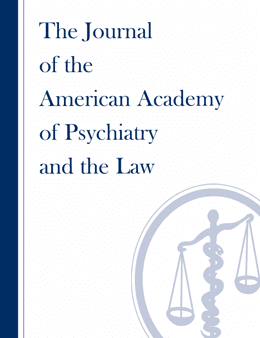
JOURNAL OF THE AMERICAN ACADEMY OF PSYCHIATRY AND THE LAW
Transforming Understanding in Psychiatry and LawJOURNAL OF THE AMERICAN ACADEMY OF PSYCHIATRY AND THE LAW, published by the American Academy of Psychiatry and Law, is a pivotal resource for researchers and professionals engaged in the intersection of mental health, law, and forensic evaluation. With an ISSN of 1093-6793 and an E-ISSN of 1943-3662, this journal has been at the forefront of disseminating critical findings and discussions since 1997, now extending through 2024. Positioned within the Q3 category for Medicine (miscellaneous), Pathology and Forensic Medicine, and Psychiatry and Mental Health, it highlights its significance within these disciplines. Although the journal currently operates under a traditional access model, it remains a valuable platform for scholarly articles that inform practice and elevate understanding of legal psychiatry. Researchers are encouraged to explore its contents to stay abreast of contemporary issues and advancements in forensic psychiatry, making it an indispensable resource for education and practice.

De Jure Law Journal
Connecting Researchers and Practitioners in Legal Studies.De Jure Law Journal, published by Pretoria University Law Press, is a reputable open access journal that has been serving the legal community since its establishment in 2011. With its commitment to disseminating high-quality research, this journal focuses on various aspects of law and legal principles, encompassing a broad range of topics from constitutional law to international legal frameworks. The journal's ISSN 1466-3597 and E-ISSN 2225-7160 ensure that it is easily accessible and widely recognized in academic circles. Positioned as a significant contributor to legal scholarship in South Africa and beyond, De Jure Law Journal is dedicated to fostering a critical dialogue among researchers, practitioners, and students alike, making it an essential resource for anyone engaged in legal studies.

OSGOODE HALL LAW JOURNAL
Exploring Contemporary Legal Issues with DepthOsgoode Hall Law Journal, published by the renowned York University Osgoode Hall Law School, serves as a vital platform for legal scholarship in Canada. With a commitment to advancing knowledge in various fields of law, this journal publishes a broad range of articles, case studies, and critical analyses that address contemporary legal issues. While specific impact factors and indexing metrics such as H-Index and Scopus Ranks are not available, the journal's long-standing reputation and contributions to legal education make it an essential resource for researchers, legal practitioners, and students alike. Although it does not offer Open Access options, readers can access its content through libraries and subscriptions, ensuring the dissemination of high-quality legal research. The journal's aim is to foster robust dialogue among legal scholars and practitioners, thereby shaping the future of legal discourse in Canada and beyond.
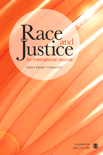
Race and Justice
Pioneering research at the crossroads of race and justice.Race and Justice is an esteemed academic journal published by SAGE Publications Inc, dedicated to advancing the discourse surrounding race and its complexities within the realms of justice, law, and sociopolitical dynamics. With its ISSN 2153-3687, the journal has positioned itself prominently in the Q1 category across multiple disciplines, including Anthropology, Law, and Sociology and Political Science. Since its inception in 2011, Race and Justice has become a vital resource for researchers, professionals, and students, offering rigorous peer-reviewed articles that explore critical issues related to race and systemic justice. It boasts impressive Scopus rankings, placing it in the 96th percentile for Anthropology and the 95th percentile for Law, highlighting its significant impact in the social sciences. This journal not only fosters scholarly inquiry but also encourages critical dialogue on the implications of racial issues in the justice system. Although it is not an open-access journal, its comprehensive scope and high standards make it indispensable for anyone engaged in the study of race and justice.
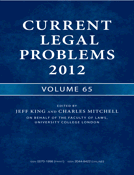
Current Legal Problems
Advancing legal discourse for a dynamic world.Current Legal Problems is a premier academic journal published by Oxford University Press, dedicated to advancing the field of law through critical analysis and interdisciplinary research. With an ISSN of 0070-1998 and an E-ISSN of 2044-8422, this journal has established itself as a vital resource for legal scholars and practitioners alike since its inception in 1983. Recognized with a Q1 category ranking in Law for 2023, it ranks notably in Scopus as #415 out of 1025, placing it in the 59th percentile, further underlining its influence and importance. The journal's scope encompasses contemporary legal issues, providing a platform for innovative legal thought and discussion. Although it does not follow an open access model, the journal remains accessible through both print and digital subscriptions, catering to a global audience from its base in Oxford, United Kingdom. Researchers, students, and legal professionals will find Current Legal Problems indispensable for staying informed about the latest legal developments and scholarly debates.
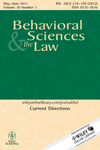
BEHAVIORAL SCIENCES & THE LAW
Transforming Legal Understanding Through Behavioral ResearchBehavioral Sciences & The Law is a premier interdisciplinary journal published by Wiley, dedicated to exploring the intricate relationships between behavioral sciences and legal systems. Established in 1983 and continuing through 2024, this journal provides a vital platform for researchers, professionals, and students in the fields of law, clinical psychology, medicine, and psychiatry. With an impressive impact factor reflected in its Q1 ranking in Law and Q3 in Clinical Psychology, Psychiatry, and Medicine, it stands out in the academic community, facilitating scholarly discourse and advancing understanding in these critical areas. While currently not following an open access model, the journal’s reach is extensive, delivering cutting-edge research and thought leadership from the United Kingdom to a global audience. Whether you are investigating the psychological dimensions of legal practice or the implications of law on behavioral health, Behavioral Sciences & The Law remains an essential resource for those committed to the intersection of these disciplines.